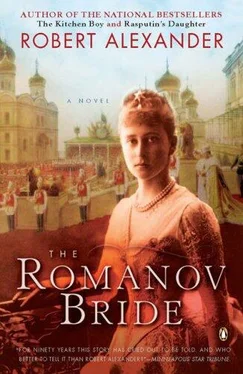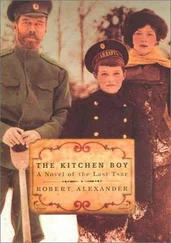I quietly replied, “So I’ve heard.”
“It’s true, I tell you, and it’s only because of them that we’re losing the war!”
Obviously he’d been a soldier, and nodding toward his missing leg, I asked, “When?”
“Last winter.” He shrugged, and added, “I suppose I’m one of the lucky ones-I was wounded, they pulled me back from the front, and a week later all my comrades were wiped out, every last one of them. I should be dead like the rest of ’em, but instead I’m just a gimp.”
I should have said something, like maybe talked about the Organization and the need for revolution. I should have grumbled about the bourgeoisie, about exploitation of the lower classes, or, really, about any of the things I had been taught. I’m sure the soldier would have listened eagerly, but I couldn’t take my eyes off the beauty in robes, the wind and the light curling around her as she stood there across the street. In reply to all her well-wishers, she simply and meekly bowed her head in thanks and hurried on, quite alone, basket in one hand while with the other she pulled her robe close to her face as if hiding herself, as if the last thing she wanted was to be recognized.
I didn’t know why, but as soon as she started off I knew that I would follow her. I mumbled something to the one-legged comrade and then hurried along until I was some twenty or thirty paces behind her. All these questions were tripping through my mind. Where was she going, what was she doing, and, most important, was there food there in that basket that I might take from her? Or was it money, eh? After all, she was heading north on Bolshaya Ordinka, so perhaps she was headed straight toward the Kremlin, perhaps she had taken a basket of money from her church and was giving it over to the ministers. Yes, that was likely, and it occurred to me then that I could kill her now, thereby finishing the job I’d neglected so long ago. I could jump on her and beat her and make myself rich at the same time, too.
But then she veered off the wide cobbled street, soon crossing Solyanka Street and weaving her way through a maze of lost alleys, ducking through one archway, past the falling-down house of a half-ruined noble, and eventually emerging onto another street. She continued up this way and then cut to a boulevard. What was this all about? By then I could tell she was not hurrying toward the Kremlin, so what in the name of the devil was this holy princess doing? Where was she headed, this sly cat? Perhaps instead of taking money to the Kremlin she was delivering a basketful of rubles to German spies. Now, I thought, wouldn’t that be wonderful if the stories passing from tongue to tongue were really true! And how great it would be if I caught her in the act, right in the middle of a secret meeting! Ha, I could report it and maybe then the people would get so mad that finally and at long last they would rise up!
Trailing her, I couldn’t stop, didn’t dare.
She had remarkable energy, that one, for she was moving so quickly that I had to trot along to keep up with her. She was all business, and yet people smiled and nodded at her as they passed, perhaps not recognizing how high and mighty she really was, only seeing the strange light robes and knowing that she was from there, that community that had become so well known and, too, so well loved throughout Moscow. Pure and simple, she was a vision of Godliness to all who laid eyes upon her, that much I could tell. Or perhaps she was just a simple reminder that some still believed with all their hearts in a better world. And yet still I couldn’t tell what she was doing, just where she was going in such a rush.
I wondered of course if she had some kind of business in Kitai Gorod, the Chinese town, but after we crossed a kanal and turned to the right, it was clear she wasn’t going that far. No, we were descending into the lowlands in and around the Yauza River. And from the mist in the air and the stench that soon filled my nose, I understood that this stupid, foolish woman was heading straight into the Khitrovka, the famous slums of Moscow, which sprawled around a dangerous market selling rotten food and stolen goods, not to mention young girls, even young boys. Bozhe moi, my God, this was the most hellish corner of the country, and even I wanted to run up and tell her, No, stop, it’s too dangerous! Don’t go in! Word was that ten or twenty thousand pathetic souls lived in this Godforsaken area, a collection of thieves and robbers, beggars and murderers. If anyone escaped the labor camps of Siberia, they didn’t stay out in the forests. No, they snuck all the way back here, because both the police and the soldiers were too afraid to go into the depths of the Khitrovka and flush them out. Even my revolutionary pals told me that if I was ever found out, if I was ever chased, this was where I should run, straight into these slums. Of course, the lowlifes in and about might cut my throat for a ruble or plunge a knife in my back for pleasure, but at least the police wouldn’t catch me, oh, no!
But the nastiness of the Khitrovka seemed not to faze her in the least. In fact, the misery ahead seemed to draw her, and this sister of the Empress, this princess who had once danced the mazurka on the finest parquet floors in the greatest palaces, this greatest of European beauties, stepped through an open sewer along which slowly ran human waste of the nastiest sort. When she came to the corner of a crumbling building, she turned left, obviously certain of where she was going. Wasting no time, I hurried along, turned the corner, and nearly ran into her and three big, thick policemen, for there she stood, this woman in robes, talking to the giant men.
“Please, Matushka,” said one of the uniformed ones, “in a block or so you’ll enter the heart of the Khitrovka, and this is as far as the three of us dare go. We ask you again and again, please, no farther! If something happens in the streets ahead, we will not be able to go in to help you.”
“My dear men, you are always too kind to me and I so appreciate your good thoughts,” she replied in the gentlest of voices. “But, once again, I am needed in these parts.”
“Yes, but-” began another constable.
“Please, my boy, do not worry. My life is in God’s hands, not yours.”
With a kind wave and smile, she pressed on, going where certainly no princess had ever gone, deep into the filthy Khitrovka. I myself thought of turning back, but curiosity had hooked me, and I tailed her into a dark alley where the sun was all but blotted out. I couldn’t help wondering, if those policemen back there on the edge of the Khitrovka knew her by sight, just how often did she come here and what in the name of the devil was her business? Might it not be with spies and Germans?
As I traipsed after her, nearly losing her from sight, I heard screaming, then breaking glass. From another direction came drunken laughter and crying children. As I passed a traktir-the cheapest of taverns-its doors were shoved open by two men, laughing and stumbling, and a stinky cloud of stale beer and boiling cabbage overwhelmed me. A few steps later I came to a man slumped against a building, lying in a puddle of his own vomit. All this I saw, and a woman with a painted face who stood in a doorway marked with the required red lamp. When I glanced at her she pulled open the top of her dress and showed me her huge naked breasts.
“Right this way, handsome,” she called, licking her lips.
I looked away. This place was nothing but a pile of roaches feasting on one another, and like an insect myself I scurried on. Rounding a corner after the princess nun, I watched as she proceeded down a lane of disgusting shops, this one selling something that was supposed to be sausages, another grimy bread, and there, a guy chopping chickens on a huge stump and throwing the carcasses on the floor. Next I saw a handful of tailors working frantically away as they transformed stolen fur capes and coats into unrecognizable hats and muffs. Up and down the passage were gathered clumps of men, too, and great wafts of smoke from papirosi-the cheapest cigarettes-curled into the dark air, mingling with the scent of sour sunflower oil that came from every kitchen. Time and time again they greeted this lowly Romanov not with a sneer or snarl or the least bit of coarseness-let alone a threat of any kind-but with a simple and polite nod of the head.
Читать дальше












